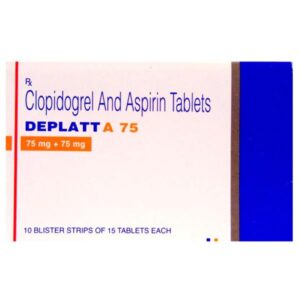CLOPIDOGREL + ACETYL SALICYLIC ACID (ASA OR ASPIRIN)
Clopidogrel: Clopidogrel, also known by its brand name Plavix, is a medication primarily used to prevent blood clots in patients with certain cardiovascular conditions. It belongs to a class of drugs called antiplatelet agents.
The mechanism of action of clopidogrel involves inhibiting the platelet aggregation process. It does this by irreversibly binding to the adenosine diphosphate (ADP) receptor on platelets, preventing the activation of the glycoprotein IIb/IIIa receptor complex. This ultimately reduces the ability of platelets to stick together and form blood clots.
Clopidogrel is commonly prescribed to individuals who have had a recent heart attack, stroke, or have peripheral artery disease (narrowed arteries in their legs). It is also used after certain procedures like coronary artery stenting to prevent clot formation.
The usual recommended dose of clopidogrel is a single 75mg tablet once daily. However, in some cases, a loading dose of 300mg may be prescribed initially. The duration of treatment varies based on the individual’s medical condition and the advice of their healthcare provider.
Common side effects of clopidogrel include bruising, bleeding, and prolonged bleeding after injuries. More serious side effects may include severe bleeding, gastrointestinal bleeding, and allergic reactions. It is important to notify a healthcare professional if any unusual bleeding, severe headache, dizziness, or skin rash occurs.
As with any medication, it is essential to follow the prescribed dosage and to inform the healthcare provider of any other medications or supplements being taken to prevent potential drug interactions.
Acetyl Salicylic Acid (asa Or Aspirin): Acetyl Salicylic Acid, commonly known as aspirin, is a nonsteroidal anti-inflammatory drug (NSAID) that is widely used for its analgesic (pain-relieving), anti-inflammatory, and antipyretic (fever-reducing) properties. It is available over-the-counter and also prescribed for various medical conditions.
Aspirin works by inhibiting the production of prostaglandins, which are chemical mediators involved in inflammation, pain, and fever. By blocking the enzyme cyclooxygenase (COX), aspirin prevents the production of prostaglandins from arachidonic acid, thereby reducing inflammation and pain.
The recommended dose of aspirin varies depending on the condition being treated. For pain relief and fever reduction, the typical dose for adults is 325-650 mg every 4 to 6 hours, not to exceed 4 grams per day. For the prevention of cardiovascular events (such as heart attack or stroke), a lower dose of 81-325 mg per day is typically prescribed.
While aspirin is generally safe when used as directed, it may cause some side effects. Common side effects include stomach upset, heartburn, and gastrointestinal bleeding. Prolonged use of high doses of aspirin may increase the risk of gastric ulcers and gastrointestinal bleeding. Aspirin also has a blood-thinning effect, which can be beneficial for cardiovascular patients, but it may increase the risk of bleeding. Rarely, aspirin can cause allergic reactions, ringing in the ears (tinnitus), and gastrointestinal ulcers.
Aspirin should be used with caution in individuals with a history of stomach ulcers, bleeding disorders, asthma, and kidney or liver problems. It is not recommended for use in children and teenagers due to the risk of Reye’s syndrome, a rare but serious condition that can occur after a viral infection and aspirin use.
The use of aspirin in pregnant women or during breastfeeding should be discussed with a healthcare professional, as there may be potential risks to the fetus or the nursing infant.
It is important to read and follow the instructions on the packaging or consult a healthcare professional for appropriate usage and dosage information.




